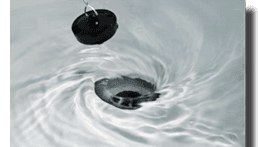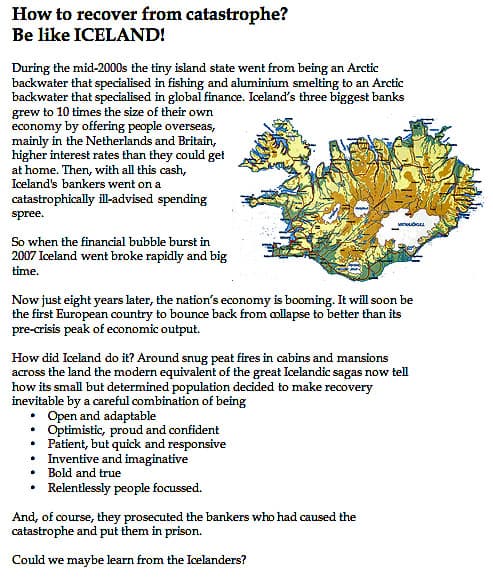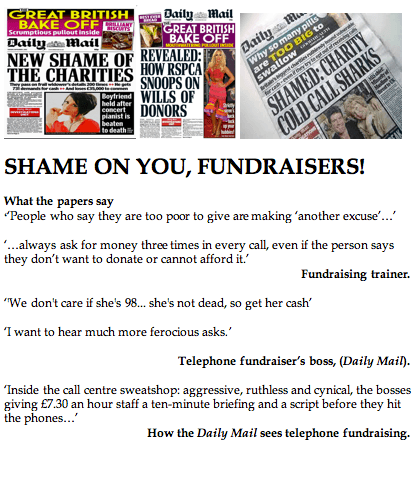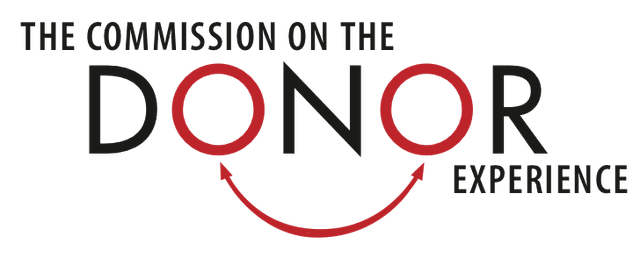Introducing the Commission on the Donor Experience
- Written by
- SOFII
- Added
- October 21, 2015
Just how much pressure is appropriate to get someone to give money to a charity? Is it ever OK for any donor, anywhere, to feel pressurised into making or increasing a voluntary gift? When does fundraising move from comfortable, to uncomfortable, to unacceptable? And does it really matter all that much?
Judging by the ‘tsunami’ of critical comment that has filled the UK popular press these last several months, the British public seems to think it does. Shocked by the national outrage as the fundraising horror stories piled ever higher the UK Government demanded a prompt investigation. On the day his review was published Sir Stuart Etherington, chair of the review panel, said, ‘… charity fundraising has never been more important… This is why it is particularly crucial that we get fundraising right.’
The summer of 2015 will long be remembered in Britain as a time of unparalleled criticism in the public press of charity fundraisers and how they ply their trade. It might also, if we can rally to contribute to and manage the process properly, come to be remembered as the time that Britain’s fundraisers finally got their act together and began to put the donor, rather than their financial targets, at the heart of their fundraising strategies and actions.
One direct outcome from this horrible summer of discontent is the newly formed Commission on the Donor Experience. The Commission is setting out to lay down in an authoritative report the fundamental ideas and strategies that will form the core of a donor-centred approach to fundraising. For an outline of what the Commission will do, see below.
SOFII is starting to gather evidence and inputs for submission to the Commission.
Soon, you’ll be able to add your ideas, insights and evidence here. See instructions, below.
With typical wit and perception Mark Phillips in his blog suggested that the fundraising crisis could be resolved for less than £200.00 just by fundraisers buying and presumably absorbing just six classic books, all of which focus on putting the donor, not the fundraiser’s targets, at the heart of fundraising strategies.
Of course there are lots of examples of donor-focused fundraising already on SOFII. Here are just a few, under some simple headings, that we’ll be expanding and adding to soon.
How to view the basic fundamentals of good fundraising
- The 40 foundations of fundraising (just 29 identified so far).
- The 11 pillars of wisdom.
- Why would anyone support 12 different charities?
How to make your donors feel really good
- Does saying thank you really work?
- How to write a better thank-you letter.
- A welcome pack that shows donors they’re appreciated,
plus lots more about saying welcome nicely, on SOFII. - How to inspire your donors, from 100 years ago.
- An old-fashioned plea for respect.
- How to find out what your donor is thinking.
And How to get inside your donor’s brain.
Some wrong ways to do fundraising. And some of the right ways.
- The way we think about charity is dead wrong.
- Mystery shopping tests.
- To ask or not to ask when thanking donors.
Helpful ways to put your donor at the heart of your fundraising
- Fifty ideas that could transform how the public views street and door-to-door fundraising.
- Plus one great idea worth copying, from Amnesty.
- How to put yourself in your donor’s shoes.
- How should we use the donate button to engage donors?
- A donor’s view of making an online gift.
- How some phone calls united an organisation with its supporters.
That’s just for starters. Inspired by the Commission SOFII will be adding new sections such as ‘Bad Language', 'How to talk about your donors and how not to', 'How to get really good at storytelling', 'What should a donor-centred service culture look like for charities large and small?' and 'Should there be a new covenant between charities and their donors?'. Plus much more too.
With the Commission’s permission, SOFII plans to publish the outcomes from all of their findings and deliberations in a special yet-to-be constructed area dedicated to providing you, SOFII’s users, with the best information available anywhere on how to improve the donor experience.
So we wish the Commission well. We’ll keep you informed of its progress as its work develops and will let you know whenever there’s an opportunity for you to contribute your views and experience to shaping their final report.
What the Commission will do
‘Fundraising your donors will respect and welcome and your mother can be proud of.’
The Commission’s objective is to increase both funds raised and donor satisfaction by appealing to the feelings, thoughts and desires of donors as well as emphasising the needs of the charity. The Commission will identify best practice and capture examples of it in order that these should become shared and common practice.
It will avoid duplication of what already exists and instead strive to collate and distil the best of all that’s available or currently being worked on, including encouraging new, as yet unidentified, initiatives.
The Commission is currently assembling an ‘enthusiasts’ group that will act as an advisory and steering body, taking over many of the practical tasks of the Commission from the initiating group. A second group, the fundraising advisors, will be tasked with raising the funds the Commission will need to do its job. Other volunteers will be co-opted, as appropriate. Please do volunteer if you feel you can contribute to any of the Commission’s areas of work.
How the Commission on the Donor Experience will work
It will work in six main areas to turn a well-documented and accepted theory of donor-centred fundraising into consistent, sustainable practice. It will focus at least as much on what fundraisers should do, as what they shouldn’t. And it will consult widely and borrow heavily to achieve this. It will:
- distil and define our best understanding of what donors want and how they feel;
- identify practical things fundraisers can do to ensure donors stay at the heart of all their actions;
- share and communicate that experience far and wide;
- ensure a better experience for new donors at and around the time of their first support;
- look at what’s available in training and equipping all fundraisers to deliver the best practical donor experience and seek to define the skills, attributes and personal qualities they’ll need;
- consider not just the body of existing knowledge, but also what we don’t yet know and how we might innovatively reinvent the donor/cause relationship.
Any questions or offers of assistance please do get in touch. For your free copy of the Commission’s occasional updates please email here.
This Commission needs radiators, not drains

It’s been said there are two kinds of people in the world, the radiators and the drains. Radiators spread warmth and enthusiasm, drains suck out optimism and positivity substituting them with negativity and reasons not to try.

To make its ambitious dream come true the Commission on the Donor Experience needs radiators to volunteer to add their experiences, innovations and insights and to guide their output. Drains need not apply,
As a well-known radiator SOFII is perfectly placed to help the Commission with two of its huge objectives
- Accessing and sorting the vast body of knowledge on donor-centred fundraising that already exists on SOII and improving it’s accessibility.
- Involving and engaging as wide an audience as possible to ensure that all fundraisers everywhere have a fair, equal and democratic chance to contribute to the Commission’s thinking and output.
What SOFII is planning to do.
We already have a collection of great fundraising best practice, which we will be offering to the Commission as it sets about its work. Over the coming weeks we’ll be adding updates about the Commission and making these available to SOFII users too. And we’ll be alerting SOFII users, wherever they are, to opportunities to have input into the Commission’s work.
So no one, except the drains, will be able to complain that the Commission on the Donor Experience is anything other than inclusive.
We’ll also promote any content added to the Commission’s website, http://www.donor-experience.com (NB this website isn’t active yet.)




















